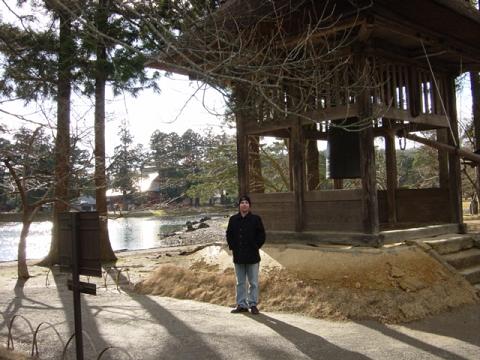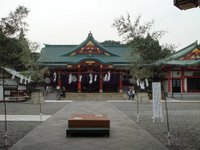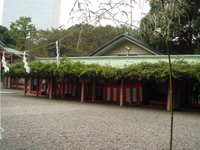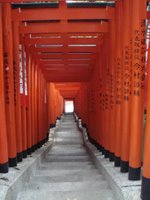First, is a little fun. This Japanese car company, Mitsuoka, I'm in love with their "Orochi" car which is an expensive (only 1,000 a year are made and there's a waiting list) car. The design is based on this ancient mythical serpent. It's quite cool. I'm sure googling could find it for you.
I saw today that they have these mini-cars that are sold as kits. Mini-cars, scooters, half-bike/half-scooters, all kinds of small vehicles are all over Japan. They drive fast enough, they have springs and gyrators and stuff to keep things from tipping or breaking, they get great mileage. The mini-car kits start at about $3,000 and are available as gas or electric. They arrive in about 500 parts I think, and it takes about 3 days to put one together. Here's the link:
http://www.mitsuoka-motor.com/english/lineup/microcar/index.html
Next up, something I've always found interesting. Here's a chart of the amount of people in prison in various countries for 1995. I suppose it's not that different today, though I didn't find a picture chart. This is by population, so the numbers aren't skewed in that way. Before looking at this, please remember that Japan has a conviction rate of near 99%, i.e., if you get arrested, you've got a 99% chance you're being convicted, therefore a good chance you're going to prison.
http://www.hr95.org/pix/world.GIF
And on a fun and interesting note, here's a great site of Japanese vending machines. This is a very incomplete collection, but has a few standouts that you'd probably only find here (girls' used panties, dry ice, rice, etc.)
http://www.photomann.com/japan/machines/
Wednesday, November 22, 2006
Short video of Mita in Tokyo
I was walking from the train station today and decided to grab my camera out and video a bit. It's hard to make anything out, but you can kind of get a feel for the place. In the video are restaurants, restaurant signs, convenience stores, basic Tokyo stuff.
I really want to talk about Japanese convenience stores but I'll save it for later.
The video should appear below. If not, please use the link.
http://youtube.com/watch?v=1P2d_RDnark
I really want to talk about Japanese convenience stores but I'll save it for later.
The video should appear below. If not, please use the link.
http://youtube.com/watch?v=1P2d_RDnark
Thursday, November 16, 2006
Second Language, The First
I was reminded yesterday of something I debated with a group of "philosophers" some years ago. It was on learning a second language.
The main topic came when a person said that "You can never truly learn a second language."
It's probably the topic of a lot of philosophy courses and talks.
His idea was "When we are growing up, we learn how to label things with language. When we see a ball or a nipple or our mother at first, we just see it, but later we learn through our parents and society that that ball or nipple or mother is called "ball" and "nipple" and "mama." So, we have objects and feelings and all sorts of things that exist in the world, and then we have labels attached to those."
The idea is something like this rough illustration:
__We see a round object__ ============= ball.
But when we learn a foreign language, the second language only refers to the first language. For instance, in Japanese, ball is "tama." So learning a second language is like this rough illustration:
__We see a round object__ ============= ball. ----------------- tama.
It is abstracted from our original perception of the object itself, filtered through our "first language." We have some primal language that is directly associated with the objects, and then when we learn a second language, we "translate" hmmm.. I see a ball.. what's that in Japanese? hmmm. .. ah yeah, tama!
Since it is abstracted in this way, it is never truly _our_ language. It is something that we refer to outside ourselves. However, I am quite sure it is the case that words, phrases and sentences from as many languages as you can know will be directly linked to objects "out there" by a star shape rather than the line as above.
Of course, this is a somewhat strawman version of the argument, but it's easy to see that it's incorrect from a few viewpoints:
#1) The person espousing this viewpoint could not speak any other language than English. Far be it from me to take advice about polyglotism from a monolinguist, sorry.
Ok, that was easy.
#2) There was a time in the past, as a part of a personality quirk, I thought it would be fun to always say in Italian, "thank you, hippopotamus" whenever a "thanks" would be required in social circumstances. Soon enough, it came without thinking. I never thought "hmm I should say thank you to this person, how do you say it humorously in Italian?" It became a standard part of speech. Which leads me to #3.
#3) If you forget about certain things like pronunciation and grammar, You could replace a word from your native language with a word from any other, and simply say THEY ARE SYNONYMS. Even in your native language there are synonyms, I.e. words that refer to the same thing. It makes the second illustration ridiculous if you think about this. Sure, there are different connotations, but a ball is also a sphere. If you see a sphere, do you then observe it, think 'sphere' and then 'translate' 'sphere' to 'ball'?
#4) Our languages themselves contain words from other languages and flexible enough grammar to imitate almost any other language. To take Japanese for example, we often use ninja, sushi, kimono, and so on as English words, while they are Japanese in origin.
So, 4, that's pretty good. But most of them deal with replacing words and phrases but not really "owning" the second language like you own the first. And that's where my personal experience comes in. Can a second language directly refer to objects and feelings without translation and so on?
Yes. And this is part of why I brought up that the person who created that philosophical topic only knew one language. As a person that understands more than one, I have had countless experiences that simply show that position not to be true.
#1) I experience a change in personality, in way of thinking, in the way of handling the most simple of grammatic/syntactic forms (yes or no questions, positive and negatives in statements, etc.) when I switch into the "other language mode."
#2) At work today I was trying to express a concept on paper, and like countless times before, I couldn't think of the English (my native language) word. What I _could_ bring to my mind was the Japanese word for it. So what did I do? I opened the dictionary on my PC, and typed in the Japanese word, to get some ideas as to what the English word is I was looking for.
#3) I dream in foreign languages. That's big. For years now. Not all the time, just sometimes. Even when I have a dream of something that happened in my past in real life, all of a sudden the conversation will be happening in another language. In a dream, I might meet someone new (not something from my past) and we'll converse in Japanese. I understand it as its happening, and when I awake I can remember the Japanese we used, etc. If this doesn't prove the no-second-language theory wrong, I don't know what would.
#4) When I stub my toe, I bark "itee" rather than "ow" or "ouch."
"To have another language is to have a second soul". (Charlemagne).
The main topic came when a person said that "You can never truly learn a second language."
It's probably the topic of a lot of philosophy courses and talks.
His idea was "When we are growing up, we learn how to label things with language. When we see a ball or a nipple or our mother at first, we just see it, but later we learn through our parents and society that that ball or nipple or mother is called "ball" and "nipple" and "mama." So, we have objects and feelings and all sorts of things that exist in the world, and then we have labels attached to those."
The idea is something like this rough illustration:
__We see a round object__ ============= ball.
But when we learn a foreign language, the second language only refers to the first language. For instance, in Japanese, ball is "tama." So learning a second language is like this rough illustration:
__We see a round object__ ============= ball. ----------------- tama.
It is abstracted from our original perception of the object itself, filtered through our "first language." We have some primal language that is directly associated with the objects, and then when we learn a second language, we "translate" hmmm.. I see a ball.. what's that in Japanese? hmmm. .. ah yeah, tama!
Since it is abstracted in this way, it is never truly _our_ language. It is something that we refer to outside ourselves. However, I am quite sure it is the case that words, phrases and sentences from as many languages as you can know will be directly linked to objects "out there" by a star shape rather than the line as above.
Of course, this is a somewhat strawman version of the argument, but it's easy to see that it's incorrect from a few viewpoints:
#1) The person espousing this viewpoint could not speak any other language than English. Far be it from me to take advice about polyglotism from a monolinguist, sorry.
Ok, that was easy.
#2) There was a time in the past, as a part of a personality quirk, I thought it would be fun to always say in Italian, "thank you, hippopotamus" whenever a "thanks" would be required in social circumstances. Soon enough, it came without thinking. I never thought "hmm I should say thank you to this person, how do you say it humorously in Italian?" It became a standard part of speech. Which leads me to #3.
#3) If you forget about certain things like pronunciation and grammar, You could replace a word from your native language with a word from any other, and simply say THEY ARE SYNONYMS. Even in your native language there are synonyms, I.e. words that refer to the same thing. It makes the second illustration ridiculous if you think about this. Sure, there are different connotations, but a ball is also a sphere. If you see a sphere, do you then observe it, think 'sphere' and then 'translate' 'sphere' to 'ball'?
#4) Our languages themselves contain words from other languages and flexible enough grammar to imitate almost any other language. To take Japanese for example, we often use ninja, sushi, kimono, and so on as English words, while they are Japanese in origin.
So, 4, that's pretty good. But most of them deal with replacing words and phrases but not really "owning" the second language like you own the first. And that's where my personal experience comes in. Can a second language directly refer to objects and feelings without translation and so on?
Yes. And this is part of why I brought up that the person who created that philosophical topic only knew one language. As a person that understands more than one, I have had countless experiences that simply show that position not to be true.
#1) I experience a change in personality, in way of thinking, in the way of handling the most simple of grammatic/syntactic forms (yes or no questions, positive and negatives in statements, etc.) when I switch into the "other language mode."
#2) At work today I was trying to express a concept on paper, and like countless times before, I couldn't think of the English (my native language) word. What I _could_ bring to my mind was the Japanese word for it. So what did I do? I opened the dictionary on my PC, and typed in the Japanese word, to get some ideas as to what the English word is I was looking for.
#3) I dream in foreign languages. That's big. For years now. Not all the time, just sometimes. Even when I have a dream of something that happened in my past in real life, all of a sudden the conversation will be happening in another language. In a dream, I might meet someone new (not something from my past) and we'll converse in Japanese. I understand it as its happening, and when I awake I can remember the Japanese we used, etc. If this doesn't prove the no-second-language theory wrong, I don't know what would.
#4) When I stub my toe, I bark "itee" rather than "ow" or "ouch."
"To have another language is to have a second soul". (Charlemagne).
Monday, November 06, 2006
Gaijin - part two
I was asked some questions today about what "foreigner" means as far as Japan, so I figured it was a good time to write a bit more about "gaijin" - probably the most hated Japanese word by Western foreigners living here, in my opinion, out of misunderstanding.
First, I think that most people have trouble understanding that different places do things differently. It sounds very simple, but I find that people tend to just use what they learned wherever their home is, home country, the way of thinking, etc., and then they use that perspective to look at things elsewhere, and it just doesn't work.
If you think of words like foreigner/immigrant/migrant worker in the states, there are a whole lot of bad connotations to those words, in fact, I'd venture that the latter 2 probably have no positive connotations whatsoever (foreigner can also imply exoticism, like the romantic french). With "gaijin" meaning foreigner (literally, outside person), I can see why someone at first glance would consider it a negative word.
However, let's look at Japan. It is 99% full of Japanese people. They're literally running the place! Well, actually I believe it's a little bit over 99%, putting the foreign population here at a little less than 1%. The Japanese that live here, they have basically always lived here. Their parents, aunts, uncles, children, grandparents, their grandparents' parents, going back generally centuries and centuries and millennia - they are all from Japan, they are all nationally and ethnically Japanese. This is entirely different from Western countries.
I, as a white person, do not appear Japanese. There must be a name for me. One could be an idealist and say "we're all human," but the reality of things is obviously different from that. Should I be called non-Japanese? But what if I become a citizen of the nation? Then should I be called an ethnically-non-Japanese Japanese national?
Let's look at it from another perspective.
When I go to a restaurant or famous shrine or something, a Japanese booth worker will look at me and hand me the English version of the menu/brochure (if one exists), or they will try to speak English with me.
Imagine, in America, if a shop worker saw someone of seemingly Latin or African features and so on, and the shop worker walked up to the person and started speaking Spanish or Swahili! It'd be cause to sue the company and win big discriminatory money. However, in Japan, you do not look Japanese in any sense of the word, so that person is actually trying to bridge what is most likely a language gap (yes, most Western foreigners here don't speak Japanese), and help you. There is the possible misunderstanding - I could be from some small Italian village where no one speaks any English - but still the odds are if I am not Japanese looking, I probably can speak English. So, it's a good bet - and it helps a WHOLE LOT of people out here - the same people that will complain about "gaijin" being discriminatory!
OK, that's all fine and good. But is "gaijin" discriminatory? Yes. Is all discrimination bad? No. Just like classifications in science, we need names for things. Is this a cop-out? No. I'll explain further.
Not only that, while a shop worker would get sued over the above "discrimination," most "minorities" in America prefer to be called Asian American, Latin American, African American - they _WANT_ discrimination - because they want to keep their identity. Japanese is, likewise, the identity of this entire nation... And that brings us to...
"Gaijin" is made from two Japanese kanji characters - the first meaning outside/outer and the second meaning person. Japanese culture is group based. Your are either part of a group or you are not. These groups are pervasive - Japanese people themselves are a group. You are outside that group, you are an outside person - just as a Japanese person that works for Sony is outside the group that works for Kikkoman. These in-group and out-group relations are extremely important in Japan. Yes, you are being told you are not Japanese. You will never be Japanese. It's not in your blood, it's not in your genes, it can't be seen on your face. They are telling you something you already know.
Of course, you may say "but isn't that discriminatory - keeping you out of the group?" And that is true. Japan is a tough nut to crack as far as belonging to any Japanese group. However, many many people have seen and have said that the more Japanese language and culture you know, the more the Japanese start treating you like one of them - and holding you to responsibilities as deeply as they hold them for other Japanese. Above that, the people that reallly have good Japanese knowledge are held in very high esteem and wind up in many prestigious/important/etc Japanese groups.
Next, are gaijin discriminated against? Maybe we need a new term for this - "discriminated for!" Westerners are generally treated here as something like royal visitors, movie stars, etc. Native English speaking ability is almost worshipped here. The benefits of being a foreigner in Japan are greater than those of being a Japanese person in Japan! Discriminated against? No! Discriminated for!
Next, are Japanese racist/discriminatory against foreigners? Well, like everything, that depends on the person. Some people all over the world are, some aren't. Are they in general? Well, I'd say this depends on where you are in Japan. I was in rural areas where Japanese hadn't had much experience with foreigners - and there was mostly fear. This is the definition of ignorance - they have no idea how to interact with a foreigner, they've never met one so how could they? When Japanese people are used to foreigners, I think that everything I've said above basically applies. Discrimination exists in a mostly positive way.
There is another thing - crime statistics. Many Japanese have argued that foreigners are responsible for a great amount of crime - wow, only less than 1% of the population yet this much crime? And there have been reports debunking this.
However, I was one of the translators for the official Japan Crime White Paper 2005. I could see the actual statistics for all sorts of crime, marked by age, ethnicity, gender, everything. And while on the whole, on the average, foreigners commit about as much crime as Japanese do (proportionally), certain types of crime are only committed generally by certain races, (By the way, Iranians are responsible for like 97% of the marijuana/hashish related crimes here) and to be honest about it, if you look as Asian foreigners here, you'll find that they commit alot more crime than Japanese or Whites or what-have-you. Asian foreigners are surely lumped in with the word "gaijin" but once again, based on simply looking at you, you can be "discriminated" or "discerned" to not be a Chinese paint sniffer or what-have-you.
I hope that clears things up at least a little. I have more to write but I'll wait til it's brewed a little while and comes out more structured than it would now. This is the end of part 2 on 'getting to love "gaijin"'.
Next post will be pictures from the shrine I went to today for lunch.
First, I think that most people have trouble understanding that different places do things differently. It sounds very simple, but I find that people tend to just use what they learned wherever their home is, home country, the way of thinking, etc., and then they use that perspective to look at things elsewhere, and it just doesn't work.
If you think of words like foreigner/immigrant/migrant worker in the states, there are a whole lot of bad connotations to those words, in fact, I'd venture that the latter 2 probably have no positive connotations whatsoever (foreigner can also imply exoticism, like the romantic french). With "gaijin" meaning foreigner (literally, outside person), I can see why someone at first glance would consider it a negative word.
However, let's look at Japan. It is 99% full of Japanese people. They're literally running the place! Well, actually I believe it's a little bit over 99%, putting the foreign population here at a little less than 1%. The Japanese that live here, they have basically always lived here. Their parents, aunts, uncles, children, grandparents, their grandparents' parents, going back generally centuries and centuries and millennia - they are all from Japan, they are all nationally and ethnically Japanese. This is entirely different from Western countries.
I, as a white person, do not appear Japanese. There must be a name for me. One could be an idealist and say "we're all human," but the reality of things is obviously different from that. Should I be called non-Japanese? But what if I become a citizen of the nation? Then should I be called an ethnically-non-Japanese Japanese national?
Let's look at it from another perspective.
When I go to a restaurant or famous shrine or something, a Japanese booth worker will look at me and hand me the English version of the menu/brochure (if one exists), or they will try to speak English with me.
Imagine, in America, if a shop worker saw someone of seemingly Latin or African features and so on, and the shop worker walked up to the person and started speaking Spanish or Swahili! It'd be cause to sue the company and win big discriminatory money. However, in Japan, you do not look Japanese in any sense of the word, so that person is actually trying to bridge what is most likely a language gap (yes, most Western foreigners here don't speak Japanese), and help you. There is the possible misunderstanding - I could be from some small Italian village where no one speaks any English - but still the odds are if I am not Japanese looking, I probably can speak English. So, it's a good bet - and it helps a WHOLE LOT of people out here - the same people that will complain about "gaijin" being discriminatory!
OK, that's all fine and good. But is "gaijin" discriminatory? Yes. Is all discrimination bad? No. Just like classifications in science, we need names for things. Is this a cop-out? No. I'll explain further.
Not only that, while a shop worker would get sued over the above "discrimination," most "minorities" in America prefer to be called Asian American, Latin American, African American - they _WANT_ discrimination - because they want to keep their identity. Japanese is, likewise, the identity of this entire nation... And that brings us to...
"Gaijin" is made from two Japanese kanji characters - the first meaning outside/outer and the second meaning person. Japanese culture is group based. Your are either part of a group or you are not. These groups are pervasive - Japanese people themselves are a group. You are outside that group, you are an outside person - just as a Japanese person that works for Sony is outside the group that works for Kikkoman. These in-group and out-group relations are extremely important in Japan. Yes, you are being told you are not Japanese. You will never be Japanese. It's not in your blood, it's not in your genes, it can't be seen on your face. They are telling you something you already know.
Of course, you may say "but isn't that discriminatory - keeping you out of the group?" And that is true. Japan is a tough nut to crack as far as belonging to any Japanese group. However, many many people have seen and have said that the more Japanese language and culture you know, the more the Japanese start treating you like one of them - and holding you to responsibilities as deeply as they hold them for other Japanese. Above that, the people that reallly have good Japanese knowledge are held in very high esteem and wind up in many prestigious/important/etc Japanese groups.
Next, are gaijin discriminated against? Maybe we need a new term for this - "discriminated for!" Westerners are generally treated here as something like royal visitors, movie stars, etc. Native English speaking ability is almost worshipped here. The benefits of being a foreigner in Japan are greater than those of being a Japanese person in Japan! Discriminated against? No! Discriminated for!
Next, are Japanese racist/discriminatory against foreigners? Well, like everything, that depends on the person. Some people all over the world are, some aren't. Are they in general? Well, I'd say this depends on where you are in Japan. I was in rural areas where Japanese hadn't had much experience with foreigners - and there was mostly fear. This is the definition of ignorance - they have no idea how to interact with a foreigner, they've never met one so how could they? When Japanese people are used to foreigners, I think that everything I've said above basically applies. Discrimination exists in a mostly positive way.
There is another thing - crime statistics. Many Japanese have argued that foreigners are responsible for a great amount of crime - wow, only less than 1% of the population yet this much crime? And there have been reports debunking this.
However, I was one of the translators for the official Japan Crime White Paper 2005. I could see the actual statistics for all sorts of crime, marked by age, ethnicity, gender, everything. And while on the whole, on the average, foreigners commit about as much crime as Japanese do (proportionally), certain types of crime are only committed generally by certain races, (By the way, Iranians are responsible for like 97% of the marijuana/hashish related crimes here) and to be honest about it, if you look as Asian foreigners here, you'll find that they commit alot more crime than Japanese or Whites or what-have-you. Asian foreigners are surely lumped in with the word "gaijin" but once again, based on simply looking at you, you can be "discriminated" or "discerned" to not be a Chinese paint sniffer or what-have-you.
I hope that clears things up at least a little. I have more to write but I'll wait til it's brewed a little while and comes out more structured than it would now. This is the end of part 2 on 'getting to love "gaijin"'.
Next post will be pictures from the shrine I went to today for lunch.
Saturday, November 04, 2006
Pictures of one of my neighborhoods
Well, I took 5 minutes to try out the new camera around my apartment near the NEC headquarters. You can click on the pictures to see more detail.
Tokyo Tower is a symbol of Tokyo that you find in almost every film/show/anime that you see. Just like an American movie taking place in NYC will show the statue of liberty or times square. Its image is ingrained in my head, so when the realtor starting driving into this area and I saw the tower, I started thinking this would be a great place. Here we have the view from my apartment:
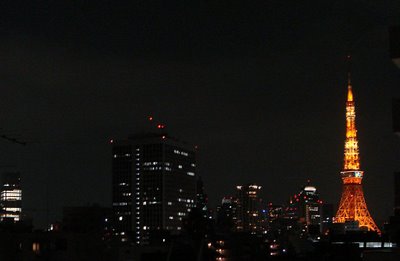
Next, this is where all the restaurants, drinking places, pachinko parlors, and all the basic night entertainment happens. This is about an 8 x 8 street grid of pedestrian-only roads for having a good time at night. The people there are about half NEC workers and half Keio University students, and me. Here's two pictures of two roads, though at this size its difficult to see how long they are and full of places to go.
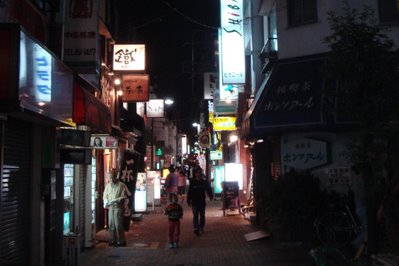
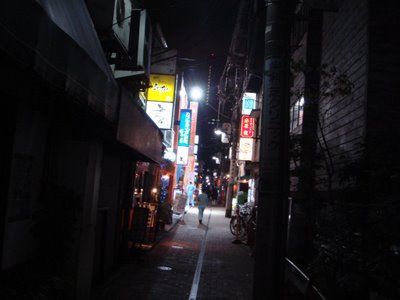
And here are two pictures of the outside of Japanese pubs (called Izakaya). A great place to relax, drink, and eat. The second picture is one of my absolute favorite places, too bad it's blurred. I'll get more pics and video of all this later. Anyway, it's hidden away down a curvy natural stone set of pathways and the whole area looks like the old Eda era of Japan. Great area, great atmosphere and food, only they sometimes play American oldies music which really doesn't fit.
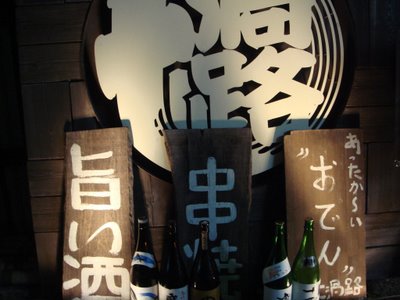

Tokyo Tower is a symbol of Tokyo that you find in almost every film/show/anime that you see. Just like an American movie taking place in NYC will show the statue of liberty or times square. Its image is ingrained in my head, so when the realtor starting driving into this area and I saw the tower, I started thinking this would be a great place. Here we have the view from my apartment:

Next, this is where all the restaurants, drinking places, pachinko parlors, and all the basic night entertainment happens. This is about an 8 x 8 street grid of pedestrian-only roads for having a good time at night. The people there are about half NEC workers and half Keio University students, and me. Here's two pictures of two roads, though at this size its difficult to see how long they are and full of places to go.


And here are two pictures of the outside of Japanese pubs (called Izakaya). A great place to relax, drink, and eat. The second picture is one of my absolute favorite places, too bad it's blurred. I'll get more pics and video of all this later. Anyway, it's hidden away down a curvy natural stone set of pathways and the whole area looks like the old Eda era of Japan. Great area, great atmosphere and food, only they sometimes play American oldies music which really doesn't fit.


Polite - Teinei
Speaking with a friend here in Japan, well you could say, I was living in Japan and he was living on the soil of Japan while still living in his home country. Though he had been here for a number of years, his language ability was poor (at a level achieved by about one year of relaxed Japanese college classes) and his understanding of the culture and behavior and so on was even lower.
This is not to bash him, though I do feel that people that come here without previous knowledge of such things, or at least without a real enthusiasm towards learning.. Well, they make life harder for me, and encourage old stereotypes.
In the conversation, I had mentioned how much I appreciate the politeness of Japanese people. Shop workers and office workers speak in such a way to put you above them (teineigo - polite language, or the even more respectful keigo), people apologize through words or body talk for bumping into you, cutting in front of you, cutting between you, many drivers turn their headlights off at intersections so as to not blind the people parked or walking in front of them, they use many cushioning words if there is any bad news to bring to you, they are quick to compliment you and downplay their abilities... It's quite amazing.
My friend's response was, "Oh, you mean that fake politeness?"
Fake politeness? I was astounded. How can something be polite in a fake way? Well, if it's insincere. I can't see the entire nation of Japan treating everyone they encounter with sarcastic smiles. It obviously can't be at that level. So then, is it the inner intent? That even though they say please and thank you, they really don't feel pleased or thankful?
Well, let's look at the main entry for "polite" in the dictionary:
1. showing good manners toward others, as in behavior, speech, etc.; courteous; civil
Does doing any of the things in that definition reflect some inner intent? No, I don't think so. Politeness is a social thing, not a human-animal thing. To me, that definition perfectly fits the way that Japanese people treat strangers, customers, etc. (Horvat, mentioned below, gets this point wrong.)
The next part of my answer to that is that Japanese believe that change happens from the outside-in. It seems backward to Westerners (of course you have to change your attitude first, then your behavior follows!), but it is a viable option. Even science has shown and many smart people have attested to the fact that if you smile, your mood starts to change!
To quote Horvat from his Japanese Beyond Words in a section called TO BE IS TO APPEAR TO BE:
"... The point was made that outward forms of respect, when carefully engaged in, produce corresponding inward attitudes, Confucian doctrine that may have a sound psychological basis. My own theory, of course, was precisely the opposite, that inward attitude comes first; that the spirit determines the outward expression and the ultimate form; really significant changes of behavior must start from within. It was a discussion repeated many times over while I was in Japan, with the Japanese invariably supporting the outward forms approach and I the inner spirit. But perhaps in the end we might agree that both are necessary. "
The politeness has a special factor involved for Japanese - the way to treat strangers (tanin). It used to be that strangers were to just be basically rudely ignored (the ignore part still certainly exists, even packed so tightly in a train with others that you can't breathe, you never feel your personal space invaded and you never feel claustrophobic, a nice benefit to being able to ignore everyone around you). However, the way of treating tanin has changed. I'm talking about old history. The relationship of in-group to out-group is very important for this, but that's for another post.
I'll finish this with another quote from Zizek.
"In Japan... even if something is merely an appearance, politeness is not simply insincere. There is a difference between saying 'Hello, how are you?' and the New York taxi drivers who swear at you. Surfaces do matter. If you disturb the surfaces you may lose a lot more than you account [for]. You shouldn't play with rituals. "
This is not to bash him, though I do feel that people that come here without previous knowledge of such things, or at least without a real enthusiasm towards learning.. Well, they make life harder for me, and encourage old stereotypes.
In the conversation, I had mentioned how much I appreciate the politeness of Japanese people. Shop workers and office workers speak in such a way to put you above them (teineigo - polite language, or the even more respectful keigo), people apologize through words or body talk for bumping into you, cutting in front of you, cutting between you, many drivers turn their headlights off at intersections so as to not blind the people parked or walking in front of them, they use many cushioning words if there is any bad news to bring to you, they are quick to compliment you and downplay their abilities... It's quite amazing.
My friend's response was, "Oh, you mean that fake politeness?"
Fake politeness? I was astounded. How can something be polite in a fake way? Well, if it's insincere. I can't see the entire nation of Japan treating everyone they encounter with sarcastic smiles. It obviously can't be at that level. So then, is it the inner intent? That even though they say please and thank you, they really don't feel pleased or thankful?
Well, let's look at the main entry for "polite" in the dictionary:
1. showing good manners toward others, as in behavior, speech, etc.; courteous; civil
Does doing any of the things in that definition reflect some inner intent? No, I don't think so. Politeness is a social thing, not a human-animal thing. To me, that definition perfectly fits the way that Japanese people treat strangers, customers, etc. (Horvat, mentioned below, gets this point wrong.)
The next part of my answer to that is that Japanese believe that change happens from the outside-in. It seems backward to Westerners (of course you have to change your attitude first, then your behavior follows!), but it is a viable option. Even science has shown and many smart people have attested to the fact that if you smile, your mood starts to change!
To quote Horvat from his Japanese Beyond Words in a section called TO BE IS TO APPEAR TO BE:
"... The point was made that outward forms of respect, when carefully engaged in, produce corresponding inward attitudes, Confucian doctrine that may have a sound psychological basis. My own theory, of course, was precisely the opposite, that inward attitude comes first; that the spirit determines the outward expression and the ultimate form; really significant changes of behavior must start from within. It was a discussion repeated many times over while I was in Japan, with the Japanese invariably supporting the outward forms approach and I the inner spirit. But perhaps in the end we might agree that both are necessary. "
The politeness has a special factor involved for Japanese - the way to treat strangers (tanin). It used to be that strangers were to just be basically rudely ignored (the ignore part still certainly exists, even packed so tightly in a train with others that you can't breathe, you never feel your personal space invaded and you never feel claustrophobic, a nice benefit to being able to ignore everyone around you). However, the way of treating tanin has changed. I'm talking about old history. The relationship of in-group to out-group is very important for this, but that's for another post.
I'll finish this with another quote from Zizek.
"In Japan... even if something is merely an appearance, politeness is not simply insincere. There is a difference between saying 'Hello, how are you?' and the New York taxi drivers who swear at you. Surfaces do matter. If you disturb the surfaces you may lose a lot more than you account [for]. You shouldn't play with rituals. "
Friday, November 03, 2006
New camera!
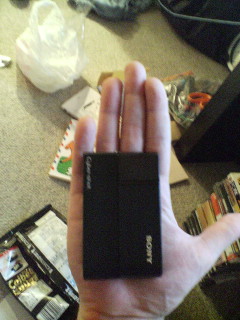
Well, I had a number of problems with my original digital camera (called dejikame in Japanese - the first two syllables of digital and the first two of camera). So I decided to go shopping for one. As I have a PSP, I wanted one that could use the same memorysticks so I wouldn't have to buy an additional memory card, so I went to the Sony area of the shop.
A girl there was really friendly and helpful. I told her that my last camera made a huge beep which would embarass me when I would try to photograph my meal at a nice restaurant to send to friends. Well, actually I jokingly told her I wanted it to be silent so I could sneak shots of pretty girls (called nusumidori in Japanese - its something of a nusumidori culture among all races and nationalities here).
It's got all the functions and everything I want, and it's tiny. As you can see from this photo I took of it on my cellphone.
This should help my blog as I always want to take photos and they help me think of things to write about.
Thursday, November 02, 2006
Japanese ZOMBIE
Here's a translation I did of a short story called "Zombie" by award-winning author Murakami Haruki (perhaps known in the West for a translated
version of "Norwegian Wood"). This short story is found in his "TV People" collection. "TV People" is a rather interesting story as well, so maybe I'll get around to that as well.
It has swearwords and grossness in case your religion forbids them.
I was a little disappointed to read it and not find any zombies, but it was interesting enough. And it was short enough to translate while I was waiting at the Minato-ku city ward to get some documents. If you're going to copy this, please include that it was translated by ruinatokyo and give me a comment or something.
"Zombie" by Murakami Haruki. Translation by ruinatokyo.
A man and woman were walking along a road. It was a road next to a graveyard, and it was the middle of the night and fog had risen. They didn't want to walk in that kind of place but various circumstances made it such that they had to. Their hands wrapped tightly in each others', they walked at a hurried pace.
The woman says, "This seems like something out of Michael Jackson's Thriller.."
The man replies, "Yeah, the gravestones are gonna start moving."
At that moment a "GIIIII" sound came from somewhere, like some gigantic object screeching to a halt. The two immediately stopped walking and without thinking looked to each other.
The guy laughed, "It's alright, no reason to feel nervous. Some tree branches scraped together, that's all... from the wind or..."
But the wind wasn't blowing. The girl swallowed her breath and looked around. She felt something really bad. A feeling like something terrible was going to happen. Zombies.
But she couldn't see anything - no sign of any dead come back to life - not anything. They started walking again. Then, the guy's face suddenly changed - he was making a strange face - as if he was "putting on" a face.
He suddenly let out, "Why are you walking in such a shameful way?"
Her, surprised, "Me?"
He replied, "It's disgusting."
Her: "Really?"
Him: "Bowlegged!"
The girl pursed her lips. She thought 'yeah, maybe I am a little... the soles of my shoes do wear out only on one side... but for someone to go outta their way to bother to say it so directly to my face..." She felt it was just plain mean.
But she didn't say anything. That is, she loved him and he loved her. They were planning to get married next month. She didn't want to have a stupid fight. 'Yeah, I'm a little bowlegged, fine," she thought.
He continued, "Being with a bowlegged girl, this is a first for me."
A stiff smile floated on her face, "Really?" and she thought 'Is this guy drunk?... No, we didn't drink at all today..."
Him: "And on top of that, you have three ugly moles on your ear."
Her: "Huh? seriously? which ear?"
Him: "The right one. Just on the inside, there's three of em. Three rough dirty-looking ugly moles."
Her: "Do you hate moles?"
Him: "I hate rough dirty-looking ugly ones."
She closed her mouth more and more tightly.
Him: "And there are times where you just smell absolutely awful. I noticed it a long while ago. Hell, if we'd first met in the summer, I wouldn't have even dated you with that stench."
The girl let out a sigh and took her hand from his. She said, "Hey! Wait a second! Why are you talking like that? What's wrong.. you're being so cruel! Up until now... "
He interrupted, "Your blouse collar is filthy. The shit you're wearing now, why are you wearing such dirty trash? Why can't you do a single thing right?"
She remained silent. She didn't want to let her anger show.
He continued, "Fine. I've got a mountain of things I wanna say to you.
"Body odor, filthy collars, ugly moles, that's really just the start!"
"... Oh yeah, those ridiculous earrings? You look like a whore, don't you! Nah, a whore wears better than that! Might as well hang one on your nose. Your fake jewelry would be just right. "
"Oh yeah, thinking of knockoffs, your mother.. She's really a fat fucking pig!
OINK OINK! A pig! Eating like a pig with her mouth open..."
"And your father! He can't even write Japanese properly! A while back I got a letter from your family that he wrote. Everyone laughed! That asshole didn't even make it outta elementary school. Disgusting family... It's a fucking cultural slum!"
"Douse that shit in oil and light it up... that's what should be done!"
"Sizzle that blubber!"
She spoke up, "So if you feel that way, why on earth are we getting married?"
He didn't even hear her, "Fucking pig!"
"And then.. your pussy... That thing is really fucking disgusting. It's like a stretched out piece of rubber. Having something like that on your body, man, I would've preferred dying! If I were a woman and had that shit, I'd die of shame. Any way that I could find, I'd make it quick! It'd be too shameful to live."
She stopped walking, and stood there completely stunned, "I can't believe you..."
And at that moment, the guy grabbed his head with both of his hands, stopping right where he was with a pained face, and fell into a squat. His hands started tearing at his temples.
He screamed, "Ahhh! my head!... feels like it's going to split in two! I can't stand the pain!"
She spoke up, "Are you okay??"
Him: "No! I can't stand it! My skin feels like it's cracking on a grill."
She felt his face with her hand, it felt as hot as if it were being grilled. She tried rubbing it. With that his skin draggedly came unstuck like a thin surface. And with that, glistening red meat was uncovered. She swallowed her breath again, jumping back away from him.
He stood up with a broad grin on his face. He started feverishly peeling the rest of his face off with his own hands. His eyeballs slopped out of their sockets like mud.
His nose was nothing but two dark holes.
His lips were gone, his mouth nothing but naked teeth.
And those teeth made a sick grin.
He spoke, "You.. the reason I got with you.. to eat your pig-like meat. You think there's some other reason? Just no idea. Aren't you a fool. Aren't you a fool. heh... heh... heh..."
And that naked pile of flesh took off chasing after her. She ran for her life, but there was no way for her to
get away from that lump of meat at her back. From the edge of the graveyard, a slimy hand grabbed hold of her blouse. She screamed with all of her power.
He grabbed her and embraced her. Her throat went completely dry. He looked at her with a smile, "What's wrong? You have a nightmare?"
She brought the blood back flowing in her body and looked around. They had been sleeping together in a hotel by a lake. She shook her head. "I screamed?"
"Terribly!" he said with a laugh. "It was an incredible shriek! I think everyone in the hotel heard it. I wouldn't doubt that they think there was a murderer here."
Her: "Sorry!"
Him: "No big deal. Bad dream?"
Her: "Worse than anyone could think. "
Him: "Wanna tell me?"
Her: "I don't want to talk."
Him: "Talking about it is best. If you tell someone, the bad vibrations disappear."
Her: "Yeah, I just don't want to talk now."
They were both silent for a bit. She wrapped herself around his arm. The croaking of a frog could be heard from far away. She could hear his heart relaxedly, steadily beating.
"Hey.. there's something I want to ask you..." she said.
Him: "What is it?"
Her: "Do I have moles on my ear?"
Him: "Moles? You mean the three in your right ear?"
She closed her eyes. It's going to continue.
version of "Norwegian Wood"). This short story is found in his "TV People" collection. "TV People" is a rather interesting story as well, so maybe I'll get around to that as well.
It has swearwords and grossness in case your religion forbids them.
I was a little disappointed to read it and not find any zombies, but it was interesting enough. And it was short enough to translate while I was waiting at the Minato-ku city ward to get some documents. If you're going to copy this, please include that it was translated by ruinatokyo and give me a comment or something.
"Zombie" by Murakami Haruki. Translation by ruinatokyo.
A man and woman were walking along a road. It was a road next to a graveyard, and it was the middle of the night and fog had risen. They didn't want to walk in that kind of place but various circumstances made it such that they had to. Their hands wrapped tightly in each others', they walked at a hurried pace.
The woman says, "This seems like something out of Michael Jackson's Thriller.."
The man replies, "Yeah, the gravestones are gonna start moving."
At that moment a "GIIIII" sound came from somewhere, like some gigantic object screeching to a halt. The two immediately stopped walking and without thinking looked to each other.
The guy laughed, "It's alright, no reason to feel nervous. Some tree branches scraped together, that's all... from the wind or..."
But the wind wasn't blowing. The girl swallowed her breath and looked around. She felt something really bad. A feeling like something terrible was going to happen. Zombies.
But she couldn't see anything - no sign of any dead come back to life - not anything. They started walking again. Then, the guy's face suddenly changed - he was making a strange face - as if he was "putting on" a face.
He suddenly let out, "Why are you walking in such a shameful way?"
Her, surprised, "Me?"
He replied, "It's disgusting."
Her: "Really?"
Him: "Bowlegged!"
The girl pursed her lips. She thought 'yeah, maybe I am a little... the soles of my shoes do wear out only on one side... but for someone to go outta their way to bother to say it so directly to my face..." She felt it was just plain mean.
But she didn't say anything. That is, she loved him and he loved her. They were planning to get married next month. She didn't want to have a stupid fight. 'Yeah, I'm a little bowlegged, fine," she thought.
He continued, "Being with a bowlegged girl, this is a first for me."
A stiff smile floated on her face, "Really?" and she thought 'Is this guy drunk?... No, we didn't drink at all today..."
Him: "And on top of that, you have three ugly moles on your ear."
Her: "Huh? seriously? which ear?"
Him: "The right one. Just on the inside, there's three of em. Three rough dirty-looking ugly moles."
Her: "Do you hate moles?"
Him: "I hate rough dirty-looking ugly ones."
She closed her mouth more and more tightly.
Him: "And there are times where you just smell absolutely awful. I noticed it a long while ago. Hell, if we'd first met in the summer, I wouldn't have even dated you with that stench."
The girl let out a sigh and took her hand from his. She said, "Hey! Wait a second! Why are you talking like that? What's wrong.. you're being so cruel! Up until now... "
He interrupted, "Your blouse collar is filthy. The shit you're wearing now, why are you wearing such dirty trash? Why can't you do a single thing right?"
She remained silent. She didn't want to let her anger show.
He continued, "Fine. I've got a mountain of things I wanna say to you.
"Body odor, filthy collars, ugly moles, that's really just the start!"
"... Oh yeah, those ridiculous earrings? You look like a whore, don't you! Nah, a whore wears better than that! Might as well hang one on your nose. Your fake jewelry would be just right. "
"Oh yeah, thinking of knockoffs, your mother.. She's really a fat fucking pig!
OINK OINK! A pig! Eating like a pig with her mouth open..."
"And your father! He can't even write Japanese properly! A while back I got a letter from your family that he wrote. Everyone laughed! That asshole didn't even make it outta elementary school. Disgusting family... It's a fucking cultural slum!"
"Douse that shit in oil and light it up... that's what should be done!"
"Sizzle that blubber!"
She spoke up, "So if you feel that way, why on earth are we getting married?"
He didn't even hear her, "Fucking pig!"
"And then.. your pussy... That thing is really fucking disgusting. It's like a stretched out piece of rubber. Having something like that on your body, man, I would've preferred dying! If I were a woman and had that shit, I'd die of shame. Any way that I could find, I'd make it quick! It'd be too shameful to live."
She stopped walking, and stood there completely stunned, "I can't believe you..."
And at that moment, the guy grabbed his head with both of his hands, stopping right where he was with a pained face, and fell into a squat. His hands started tearing at his temples.
He screamed, "Ahhh! my head!... feels like it's going to split in two! I can't stand the pain!"
She spoke up, "Are you okay??"
Him: "No! I can't stand it! My skin feels like it's cracking on a grill."
She felt his face with her hand, it felt as hot as if it were being grilled. She tried rubbing it. With that his skin draggedly came unstuck like a thin surface. And with that, glistening red meat was uncovered. She swallowed her breath again, jumping back away from him.
He stood up with a broad grin on his face. He started feverishly peeling the rest of his face off with his own hands. His eyeballs slopped out of their sockets like mud.
His nose was nothing but two dark holes.
His lips were gone, his mouth nothing but naked teeth.
And those teeth made a sick grin.
He spoke, "You.. the reason I got with you.. to eat your pig-like meat. You think there's some other reason? Just no idea. Aren't you a fool. Aren't you a fool. heh... heh... heh..."
And that naked pile of flesh took off chasing after her. She ran for her life, but there was no way for her to
get away from that lump of meat at her back. From the edge of the graveyard, a slimy hand grabbed hold of her blouse. She screamed with all of her power.
He grabbed her and embraced her. Her throat went completely dry. He looked at her with a smile, "What's wrong? You have a nightmare?"
She brought the blood back flowing in her body and looked around. They had been sleeping together in a hotel by a lake. She shook her head. "I screamed?"
"Terribly!" he said with a laugh. "It was an incredible shriek! I think everyone in the hotel heard it. I wouldn't doubt that they think there was a murderer here."
Her: "Sorry!"
Him: "No big deal. Bad dream?"
Her: "Worse than anyone could think. "
Him: "Wanna tell me?"
Her: "I don't want to talk."
Him: "Talking about it is best. If you tell someone, the bad vibrations disappear."
Her: "Yeah, I just don't want to talk now."
They were both silent for a bit. She wrapped herself around his arm. The croaking of a frog could be heard from far away. She could hear his heart relaxedly, steadily beating.
"Hey.. there's something I want to ask you..." she said.
Him: "What is it?"
Her: "Do I have moles on my ear?"
Him: "Moles? You mean the three in your right ear?"
She closed her eyes. It's going to continue.
Subscribe to:
Comments (Atom)
